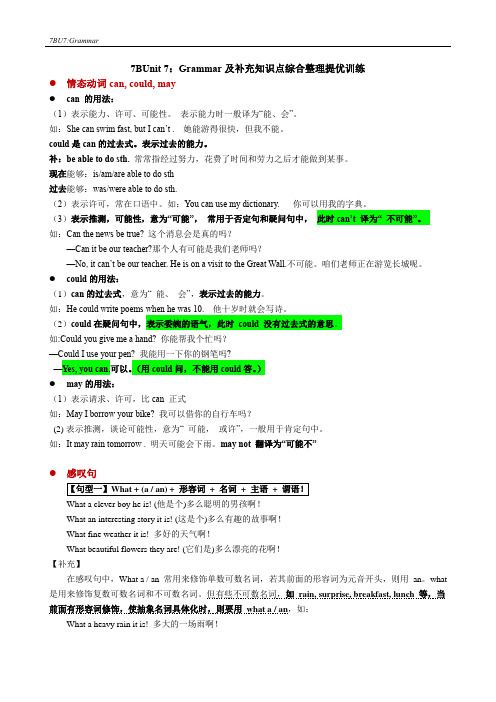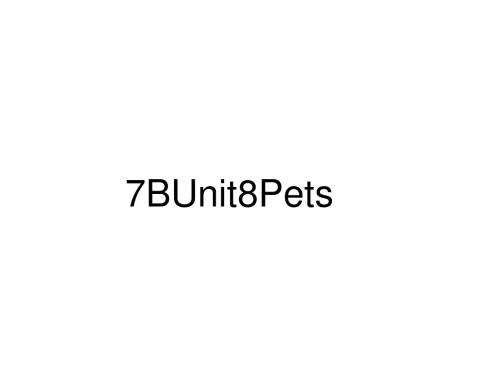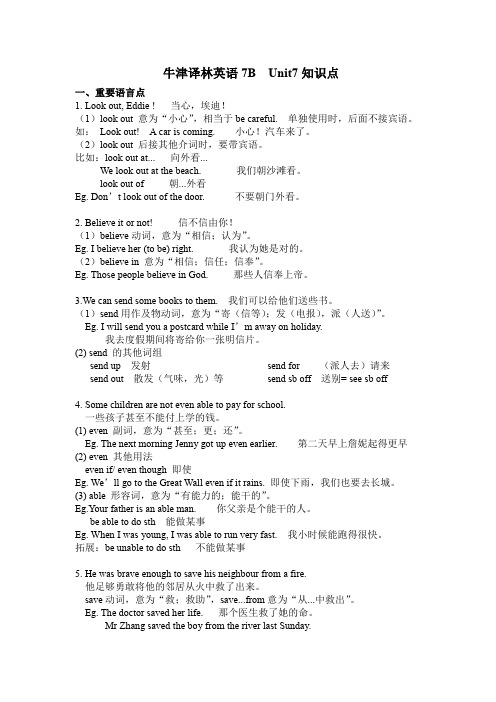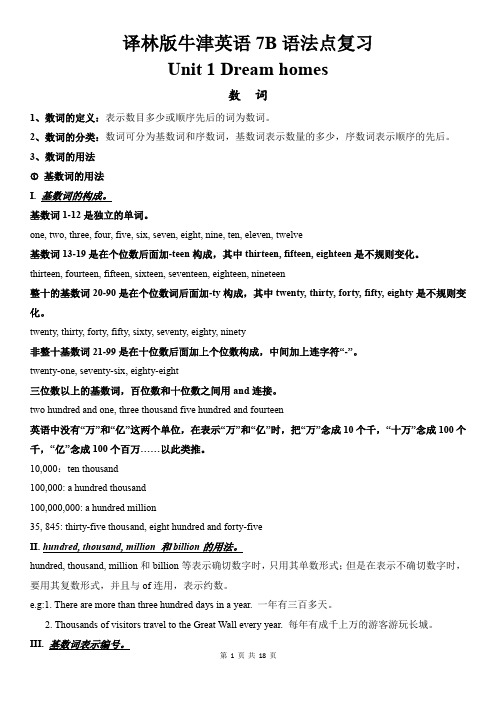牛津译林版 7BUnit7-Unit8语法复习(无答案)
牛津译林版七年级下册英语7BUnit 7:Grammar及补充知识点综合整理提优训练

7BUnit 7:Grammar及补充知识点综合整理提优训练●情态动词can, could, may●can 的用法:(1)表示能力、许可、可能性。
表示能力时一般译为“能、会”。
如:She can swim fast, but I can’t . 她能游得很快,但我不能。
could是can的过去式。
表示过去的能力。
补:be able to do sth. 常常指经过努力,花费了时间和劳力之后才能做到某事。
现在能够:is/am/are able to do sth过去能够:was/were able to do sth.(2)表示许可,常在口语中。
如:You can use my dictionary. 你可以用我的字典。
(3)表示推测,可能性,意为“可能”,常用于否定句和疑问句中,此时can’t 译为“ 不可能”。
如:Can the news be true? 这个消息会是真的吗?—Can it be our teacher?那个人有可能是我们老师吗?—No, it can’t be our teacher. He is on a visit to the Great Wall.不可能。
咱们老师正在游览长城呢。
●could的用法:(1)can的过去式,意为“ 能、会”,表示过去的能力。
如:He could write poems when he was 10. 他十岁时就会写诗。
(2)could在疑问句中,表示委婉的语气,此时could 没有过去式的意思。
如:Could you give me a hand? 你能帮我个忙吗?—Could I use your pen? 我能用一下你的钢笔吗?—Yes, you can.可以。
(用could问,不能用could答。
)●may的用法:(1)表示请求、许可,比can 正式如:May I borrow your bike? 我可以借你的自行车吗?(2)表示推测,谈论可能性,意为“ 可能,或许”,一般用于肯定句中。
译林版7Bunit7知识点讲解+练习

Unit 7 abilities一、重要句型1.believe it or not . 信不信由你believe sb 相信某人believe in sb =trust sb 信任某人2.look out =Be careful 当心look out for sth =be careful with sth 当心某物3.I can fly =I am able to fly =I have the ability to fly. 我能飞.(指某一种能力)sb can do sth =sb be able to do sth =sb has/have the ability to do sth 某人有能力做某事。
4.give a seat to someone on the bus 在公交车上给人让座。
collect things for Project Hope。
为希望工程收集东西。
give a seat to sb =give sb a seat 给某人让座。
collect sth for……为……收集某物5.How cool!多么酷!what a brave young man!多么勇敢的年轻人!How brave you are!你是多么勇敢啊!感叹句句式是由how 和what构成。
how +adj/adv+主语+谓语动词!what a/an+(adj)+可单+主语+谓语动词!what +(adj)+可数/不可数+主语+谓语动词!判断感叹句用how和what的步骤:1.先找出句子中的主语+谓语动词(括号起来不看)2.看剩下的部分是否有名词,有的话用what,无的话用how。
6.put out the fire 扑灭火put off 推迟put up 举起,张贴搭建put in 安装put on 穿上7. I didn’t have time to think about it。
我没有时间去考虑它。
(译林版)7B-Unit7语法知识点

(译林版)7B-Unit7语法知识点(译林版)7B-Unit7 语法知识点本文档将介绍(译林版)7B-Unit7中的语法知识点。
1. 形容词和副词的比较级和最高级形容词和副词的比较级和最高级用于对两个或多个人或事物进行比较,并表达大小、高低、快慢等概念。
比较级的构成方法:1. 一般在形容词或副词后面加上-er,如taller,faster。
2. 以字母e结尾的形容词或副词,直接加-r,如nicer,larger。
3. 以辅音字母+y结尾的形容词或副词,将y变为i,再加-er,如busier。
4. 多音节和部分双音节形容词或副词在前面加more,如more interesting,more quickly。
最高级的构成方法:1. 一般在形容词或副词前面加上the,再在后面加上-est,如the tallest,the fastest。
2. 以字母e结尾的形容词或副词,直接加-st,如the nicest,the largest。
3. 以辅音字母+y结尾的形容词或副词,将y变为i,再加-est,如the busiest。
4. 多音节和部分双音节形容词或副词在前面加the most,如the most interesting,the most quickly。
2. 一般过去时一般过去时用于表示过去发生的动作或存在的状态。
构成方法:1. 对于大多数动词,在动词原形后面加上-ed,如worked,played。
2. 以e结尾的动词,直接加-d,如lived。
3. 以辅音字母+y结尾的动词,将y变为i,再加-ed,如studied。
特殊情况:1. 以辅音字母+y结尾的动词,如果在末尾前有一个元音字母,则直接加-ed,如stayed。
2. 以辅音字母+ie结尾的动词,将ie变为y,再加-ed,如cried。
3. 一般将来时一般将来时用于表示将来发生的动作或存在的状态。
构成方法:1. 对于大多数动词,在动词原形前面加上will,如will work,will play。
译林版7B Unit 8 知识点讲解+练习

Unit 8 Pets一、重要句型1.Please bring me something to eat. (过去式brought)请给我拿些吃的东西。
Bring sb sth= bring sth to sb,意为“给某人拿来某物”如:Would you please bring me some chalk?= Would you please bring some chalk to me? 请给我拿些粉笔来好吗?不定代词+to do give me something to eat 给我一些吃的东西。
2. I love my parrot because he can sing, and I want to teach him to speak.我爱我的鹦鹉,因为他会唱歌,我还想教他说话。
teach sb to do sth意为“教某人做某事”如:Simon’s father is teaching him to make a kite.西蒙的父亲正在教他做风筝。
teach sb sth意为“教某人某事”。
结构中的sb如果用人称代词,则要用人称代词的宾格形式。
如:Mr Zhang teaches us English this term.张老师这学期教我们英语。
4. My dog is the cleverest animal of all.我的狗是所有动物中最聪明的。
cleverest是clever的最高级形式,意为“最聪明的”。
形容词最高级用于三者或三者以上的人或物之间的比较。
最高级前面一般加定冠词the。
(二者之间用比较级)如:Marry is the thinnest of us there. 在我们三个中玛丽是最瘦的。
Is Daniel the best student of all. 丹尼尔是所有学生中最优秀的吗?Mike is the taller of the two。
麦克在两个中最高的。
译林牛津英语(新版)7B Unit8 Pets期末复习课件

• 用…喂…
feed …(with) sth = feed sth to…
• 与…玩
play with…
• 手里拿着东西 hold sth in one’s hand
知识巩固训练
I.根据汉语意思完成句子 1.在美国,许多老人把宠物当成他们的家庭 成员。
Many old people regard their _p_e_t_s_ _a_s___ their family members in America. 2. 不要对你的父母无礼。
7BUnit8Pets
Comic strip & welcome to the unit
• 给某人拿来… bring sb sth = bring sth to sb
• 四处游动
swim around
• 在某人的膝盖上 on one’s knees
• 教某人做某事 teach sb to do sth
Don’t _b_e__ _r_u_d_e__ _t_o_ your parents.
3. 我们经常给兔子喂胡萝卜。
We often _fe_e_d__ rabbits _w_it_h_carrots. 4.丹尼尔经常教我们唱英文歌。
Daniel often _te_a_c_h_e_s_ ust_o_s_in_g____ English songs. 5. 看!他的手里正拿着一把伞。
知识巩固训练
I.根据汉语提示完成句子
1.Lucy often b_r_u_s_h_e_s(刷)her teeth after meals.
2. He_w_e_i_g_h_e_d(称重)himself yesterday.
3. There is going to be a _r_e_p_o_rt_(报告)in the
牛津译林英语7B Unit7 Abilities 知识点

牛津译林英语7B Unit7知识点一、重要语言点1. Look out, Eddie ! 当心,埃迪!(1)look out 意为“小心”,相当于be careful. 单独使用时,后面不接宾语。
如:Look out! A car is coming. 小心!汽车来了。
(2)look out 后接其他介词时,要带宾语。
比如:look out at... 向外看...We look out at the beach. 我们朝沙滩看。
look out of 朝...外看Eg. Don’t look out of the door. 不要朝门外看。
2. Believe it or not! 信不信由你!(1)believe动词,意为“相信;认为”。
Eg. I believe her (to be) right. 我认为她是对的。
(2)believe in 意为“相信;信任;信奉”。
Eg. Those people believe in God. 那些人信奉上帝。
3.We can send some books to them. 我们可以给他们送些书。
(1)send用作及物动词,意为“寄(信等);发(电报),派(人送)”。
Eg. I will send you a postcard while I’m away on holiday.我去度假期间将寄给你一张明信片。
(2) send 的其他词组send up 发射send for (派人去)请来send out 散发(气味,光)等send sb off 送别= see sb off4. Some children are not even able to pay for school.一些孩子甚至不能付上学的钱。
(1) even 副词,意为“甚至;更;还”。
Eg. The next morning Jenny got up even earlier. 第二天早上詹妮起得更早(2) even 其他用法even if/ even though 即使Eg. We’ll go to the Great Wall even if it rains. 即使下雨,我们也要去长城。
2023年新版译林7Bunit7知识点整理

Unit 7 Abilities一、重点词汇ability n. 能力believe vi. 相信seat n. 座位send vt. 送;邮寄;派遣notebook n. 笔记本even adv. 甚至able adj. 能,可以pay vt. 付钱;给...酬劳raise vt. 筹集brave adj. 勇敢旳save vt. 救,救济smoke n. 烟,烟雾vt.吸烟badly adv. 严重地,厉害地hurt vi.&vt. 使受伤,伤害;疼adj.受伤旳could modal v. (can 旳过去式) 可以,能,会pour vt. 倾倒project vt. 保护rush vi. 冲,奔wet adj. 湿旳blanket n. 毯子burn vt.&n. 烧伤,燃烧moment n. 半晌;瞬间nod vt.&vi. 点头careful adj. 仔细旳,认真旳,小心旳reporter n. 记者news n. 新闻,消息newspaper n. 报纸match n. 火柴rubbish n. 垃圾,废弃物bin n. 垃圾箱recommend vt. 推荐madam n. 女士,夫人till prep.&conj. 到...时,直到...为止camera n. 摄影机X-ray n. X光,X射线term n. 学期article n. 文章careless adj. 粗心旳piano n. 钢琴violin n. 小提琴sir n. 先生award n. 奖;奖品;奖金vt. 授予,奖励part n. 部分lose vt. 迷失;丢失;失去look out 留神;当心plant trees 植树help an old man 协助老人clean up 收拾洁净give a seat to someone 将座位让给某人collect things for 为...搜集东西Project Hope 但愿工程an old people’s home 养老院in poor areas 在贫困地区send some books to sb 送书给...pay for 为...付款different abilities 不一样旳能力be able to 能,会raise some money for 为...捐款give awards to 给...颁奖recommend someone for an award 推荐某人获奖recommendation letter 推荐信the Helping Hands Club 帮手俱乐部brave enough 足够勇敢save...from 从...中救出hear someone doing 听到某人正在做... run outside 跑出去a lot of smoke 大量旳烟next door 在隔壁the 79-year-old Mrs Sun 79岁旳孙奶奶be badly hurt 伤得很重pour water over 把水倒在...上面rush into 冲进去heavy smoke 浓烟put out the fire 灭火a wet blanket 一条湿毯子be in hospital 住院give sb flowers and presents 给某人花和礼品at that moment 在那时think about 考虑,思索be careful with 小心... call for help 呼喊讨教sound dangerous 听起来危险play with 玩ride a horse 骑马 a good place to have fun 娱乐旳好地方make a call 打电话leave...at home 将...忘在家中no problem 没问题by the way 顺便问一下,顺便说说need to read more and speak more 需要多读多说work hard on 在...努力be careless 粗心do/try one’s best 尽某人最大努力do well in 在...做得好at the age of 在...岁时show sb how to do sth 指点某人怎样做某事English-Chinese Dictionary 英中文典recommend sb for 推荐某人做...Young Star Award 青年明星奖think carefully 仔细考虑plan everything well 一切计划得好take part in 参与in need 需要 a five-year-old boy 一种五岁旳男孩lose one’s way 迷路look forward to 期望hear from 收到...旳来信二、重点句型1. Look out, Eddie ! 当心,埃迪!(1)look out 意为“小心”,相称于be careful. 单独使用时,背面不接宾语。
译林版牛津英语7B语法点复习

译林版牛津英语7B语法点复习Unit 1 Dream homes数词1、数词的定义:表示数目多少或顺序先后的词为数词。
2、数词的分类:数词可分为基数词和序数词,基数词表示数量的多少,序数词表示顺序的先后。
3、数词的用法基数词的用法I. 基数词的构成。
基数词1-12是独立的单词。
one, two, three, four, five, six, seven, eight, nine, ten, eleven, twelve基数词13-19是在个位数后面加-teen构成,其中thirteen, fifteen, eighteen是不规则变化。
thirteen, fourteen, fifteen, sixteen, seventeen, eighteen, nineteen整十的基数词20-90是在个位数词后面加-ty构成,其中twenty, thirty, forty, fifty, eighty是不规则变化。
twenty, thirty, forty, fifty, sixty, seventy, eighty, ninety非整十基数词21-99是在十位数后面加上个位数构成,中间加上连字符“-”。
twenty-one, seventy-six, eighty-eight三位数以上的基数词,百位数和十位数之间用and连接。
two hundred and one, three thousand five hundred and fourteen英语中没有“万”和“亿”这两个单位,在表示“万”和“亿”时,把“万”念成10个千,“十万”念成100个千,“亿”念成100个百万……以此类推。
10,000:ten thousand100,000: a hundred thousand100,000,000: a hundred million35, 845: thirty-five thousand, eight hundred and forty-fiveII. hundred, thousand, million 和billion的用法。
- 1、下载文档前请自行甄别文档内容的完整性,平台不提供额外的编辑、内容补充、找答案等附加服务。
- 2、"仅部分预览"的文档,不可在线预览部分如存在完整性等问题,可反馈申请退款(可完整预览的文档不适用该条件!)。
- 3、如文档侵犯您的权益,请联系客服反馈,我们会尽快为您处理(人工客服工作时间:9:00-18:30)。
—exciting news it is!
A. What B. How C. What an D. How an
()5.(2014.长沙)nervous the girl was!A.What B. What a C. How
9. Now he gets up early in the morning and never(猛冲) to school.
10. They're(筹集) money for this poor girl.
三、翻译(根据中文提示完成句子)。
1.我很开心收到来自美国的姑姑的来信。
I'm very happy tomy aunt from America.
9.我表哥是美术俱乐部的一名成员,他擅长绘画。(词数不限)
My cousin isthe Art Club and hedrawing.
10.明年,将会有数以千计的运动员参加巴西奥运会。(词数不限)
Next year, thousands of playersthe Olympic Games in Brazil.
---Yes,you.是的,可以。
3.2.may的用法:
①表示许可或征求对方的许可,有“可以”的意思,用来征求意见。比can和could都要正式一些。
如:MayIuse your computer?我可以用你的电脑吗?
②回答以may开头的疑问句有如下表达法:
May I .... ?:
1、肯定回答:
1).Yes, you can/may.
3.What +形容词+可数名词复数+陈述句(主语+谓语)!
例:What big apples ( these are )!(这些是)多大的苹果啊!
4. What +形容词+不可数名词+陈述句(主语+谓语)!
例:What fine weather ( it is )!(它是)多好的天气啊!
How
1. How +形容词(副词)+主语+谓语!
【当堂小测】
一、单项选择。
()1.—Mary, you look nice in the red dress., how much is it?—Fifty dollars.
A. On the wayB. In the wayC. From the wayD. By the way
()2.—Could you help me put up the maps on the wall?—.
A. May; Can B. Must; need C. Could; Must D. Need; Would
()3.(2014.宿迁)Andy makes few spelling mistakes.careful boy he is!
A. What B. What an C. What a D. How
A. a lotB. a lotsC. lot ofD. a lot of
()5.—Wow!beautiful the music is!—Yes. That's my favorite.
A. WhatB. What aC. What anD. How
()6.The firemen soonthe big fire.
【板块二U8语法】
【基础知识】
(一)形容词的用法:形容词是用来修饰名词或代词。
①形容词描述事物,作为修饰语,常常放在名词。
②形容词描述事物,和连系动词一起用,形容词常常放在系动词。
英语中常见的连系动词有:be, become, feel, get, grow, keep, look, seem, sound, taste, turn等。
A. five-daysB. five-dayC. five daysD. five day
()9.—you go to Xi'an with me tomorrow?—I'd love to. But I have a lot of work to do.
A. MustB. NeedC. CanD. Do
【一对一】辅导教案
教案难度:★★★☆☆
学员姓名:
授课教师:
马老师
学员学校:
学员年级:
七年级
授课科目:
英语
授课时间:
授课课题:
U7 Abilities&. U8 Pets
课程重点
课程难点
1.U8基础词汇与短语表达
1.1. U7语法can could may&.感叹句
2.2.U8语法
上课情况反馈
课后复习及作业
2.当这个医生在国外时,他一直担心迷路。(词数不限)
Hewhen the doctor was in abroad.
4.这是我们看过的有趣的一部电影啊!
5.the film we have ever seen!
4.他在10岁时就会说英语了。
5.HecouldEnglishten.
5.我们的班主任生病住院了,我们都很想念她。
6. He often leaves his homework at home. How(粗心) he is!
7. I have many musical instruments. I can play the(小提琴).
8. Is there anything interesting in today's(报纸)?
教案内容
【板块一U7语法全突破】
【基础知识】
【使用can,could和may】
1.can和could的用法:
①表示能力,意思是“能,会”。
如:Wemuch English now, but weone year ago.
现在我们能讲很多英语,但是一年前我们不会。
②表示客观可能性,意思是“可能”。
如:Shein the classroom. She is in my room now她不可能在教室里,她现在在我房间里。
③表示许可,意思是“可以”。如:Youhere for another six weeks.你可以再待在这儿6个星期。
④表示请求,意思是“可以”。
在这种语境下,使用could比can更委婉客气。could此时和can没有时态上的差别,回答时要用can。
如:---Could I go shopping with you?我可以和你一起去购物吗?
1someone/somebody可用来表示一个未指明的或未知的人,常用于肯定句。
2anyone/ anybody可以表示“”,也可以用于肯定句。
3no one/ nobody意为“没有人;没有任何人”。no one常用于书面语,nobody在口语中更常用。
4someone/somebody, anyone/ anybody和no one/ nobody具有单数含义,后面的谓语动词要用单数形式。
练习:
---MayI smoke here?我可以在这ase.
---No, you./No, you mustn’t./ No, you’d better not.请不要抽烟。
(二)用what/how表达强烈的感情:
What修饰,
how修饰。
句型
What
A. What aB. What anC. How anD. How
二、单词拼写(根据中文提示拼写单词)。
1. Her(能力) in dancing was noticed by her mother.
2. He is(勇敢的) to save the old man in the river.
3. To make our world a better place, we need to(保护) those endangered wild animals.
—Sorry, I. My watch doesn’t work.
A. can’t B. may not C. mustn’t D. needn’t
()2.—I know by what time you want the project to be done ?
—By the day after tomorrow.you finish it on time?
Our head-teacher was ill. We all missed her.
6.多么好看的连衣裙啊!
nice dress it is!
7.李华的鞋子和张慧的一样便宜。
Li Hua's shoes areZhang Hui's.
8.我盼望着与你相见。
I'm looking forwardyou.
A. No problemB. I hope soC. That's all rightD. That's a good idea
()3.Hego out because the stove was on fire.
A. may notB. can'tC. couldn'tD. might not
()4.On Children's Day, there arechildren playing in the park.
1.What + a +读音以辅音开头的形容词+单数可数名词+陈述句(主语+谓语)!
例:What a hot day ( it is )!(今天是)多么热的一天啊!
